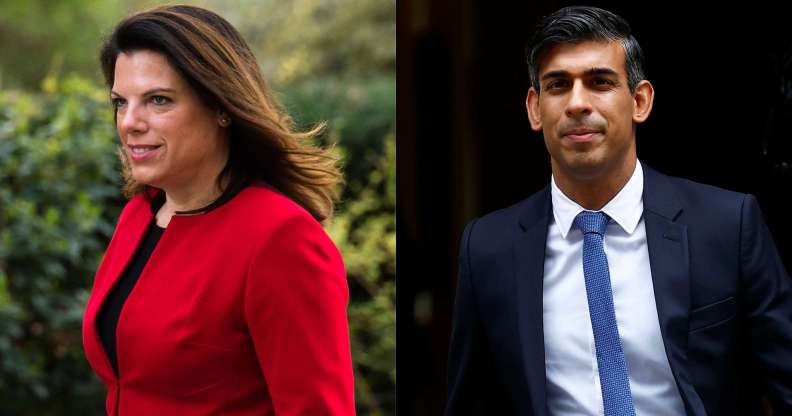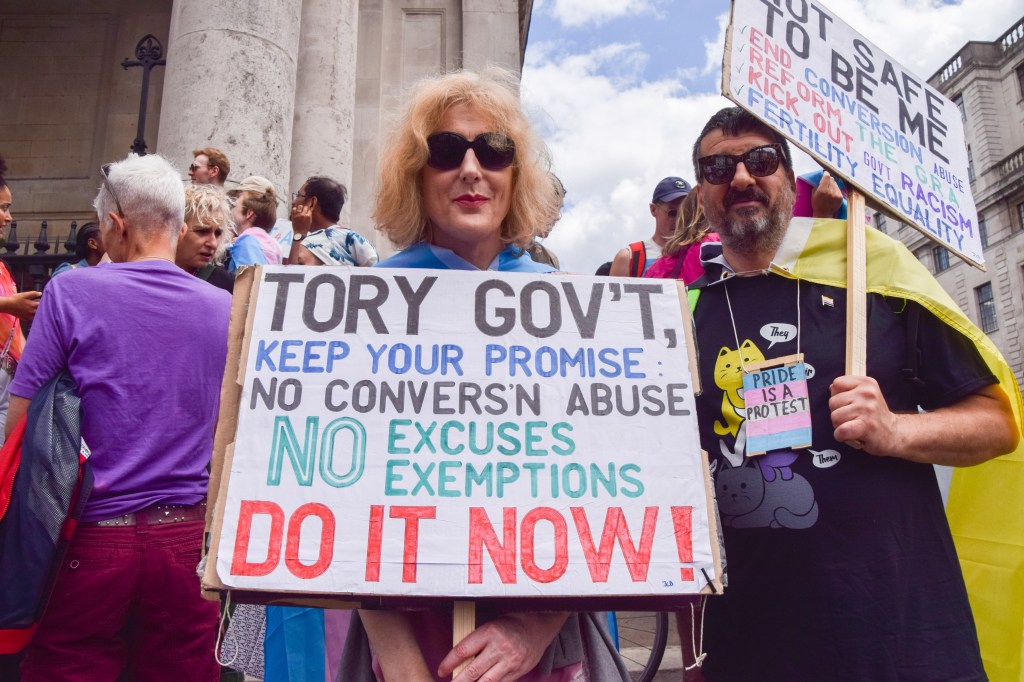Tory MP says government is ‘reneging’ on LGBTQ+ promises after conversion therapy U-turn

Caroline Nokes has said the government is “reneging” on LGBTQ+ promises after news broke that the government could scrap its long-awaited conversion therapy ban. (Getty)
Tory MP Caroline Nokes has said the government is “reneging” on its promises to the LGBTQ+ community as speculation mounts that a proposed conversion therapy ban will be scrapped.
Nokes, who is chair of the parliamentary Women and Equalities Select Committee, spoke after The Times suggested that Rishi Sunak plans to ditch long-awaited conversion therapy legislation because similar bills had proven “problematic or ineffective in other countries”.
A government spokesperson refused to provide an update on the conversion therapy bill – which was first promised by Theresa May five years ago – but said: “No one in this country should be harmed or harassed for who they are and attempts at so-called ‘conversion therapy’ are abhorrent. That is why we are carefully considering this very complex issue.”
Caroline Nokes told PinkNews that the Women and Equalities Select Committee “has been very clear” on the need for a legislative ban on conversion therapy.
“It is now almost two years since the committee highlighted the gaps in the proposed conversion therapy ban legislation and offered to undertake pre-legislative scrutiny,” she said.
“The Government Equalities Office (GEO) refused that offer and instead recommended a joint committee be established. Seven months later that committee has still not been set up and the long promised legislation has not been published.
“I can only assume the government is reneging on previous commitments to the LGBTQ+ community.”

Nokes added: “It was former prime minister Boris Johnson who described conversion therapy as abhorrent, he was right. Since then ministers have appeared in front of the Select Committee and conceded that policies reflecting the priorities of the LGBTQ+ community ‘are not in a good place’.
“To surrender a conversion therapy ban puts them in an even worse place.”
Nokes’ intervention comes after shadow women and equalities minister Anneliese Dodds accused the government of betraying LGBTQ+ people.
“Dropping the ban on so-called conversion therapy would be yet another broken promise from the Conservatives and a betrayal of those at risk of these abusive practices,” Dodds told PinkNews.
“The risible failure to outlaw this abuse shows this zombie government is completely out of ideas, and lacks the political will to deliver any meaningful change whatsoever.”
Campaigners and LGBTQ+ rights activists have also condemned the government over its ongoing failure to outlaw a practice that has been described as a form of torture.
What is conversion therapy?
Conversion therapy is a broad term which refers to a number of practices that attempt to change a person’s sexual orientation or gender identity. Research suggests that conversion therapy takes place all across the world, and can range from forms of “talk therapy” to physical abuse or “aversion therapy”.
Most medical organisations view conversion therapy as a pseudoscientific and damaging practice. The American Psychiatric Association (APA) has described it as “harmful” and has instructed its members to “refrain from attempts” to change a person’s sexual orientation.

Studies have found that those who are subjected to conversion therapy have an increased risk of suicidal ideation.
Conversion therapy has already been banned in a number of countries, including Brazil, Malta, Germany and New Zealand, while a number of other countries are in the process of outlawing the practice.
In 2018, Theresa May won praise from campaigners when she announced that her government would ban conversion therapy – but the issue quickly fell off the agenda when Boris Johnson became prime minister.
Since then, the issue has become a political hot potato. At one point, Boris Johnson even decided to scrap the ban entirely, but quickly backtracked in the face of resounding criticism. He said he would instead push ahead with a trans-exclusionary conversion therapy ban, but no legislation materialised during his tenure.
Under Rishi Sunak, the bill has continued to prove problematic – but there was a sense of anticipation in June when it was reported that the bill had finally made its way to the prime minister’s desk and was waiting to be given the final sign off.
If recent reports are to be believed, it looks as though Sunak and his government has had yet another change of heart.
How did this story make you feel?

